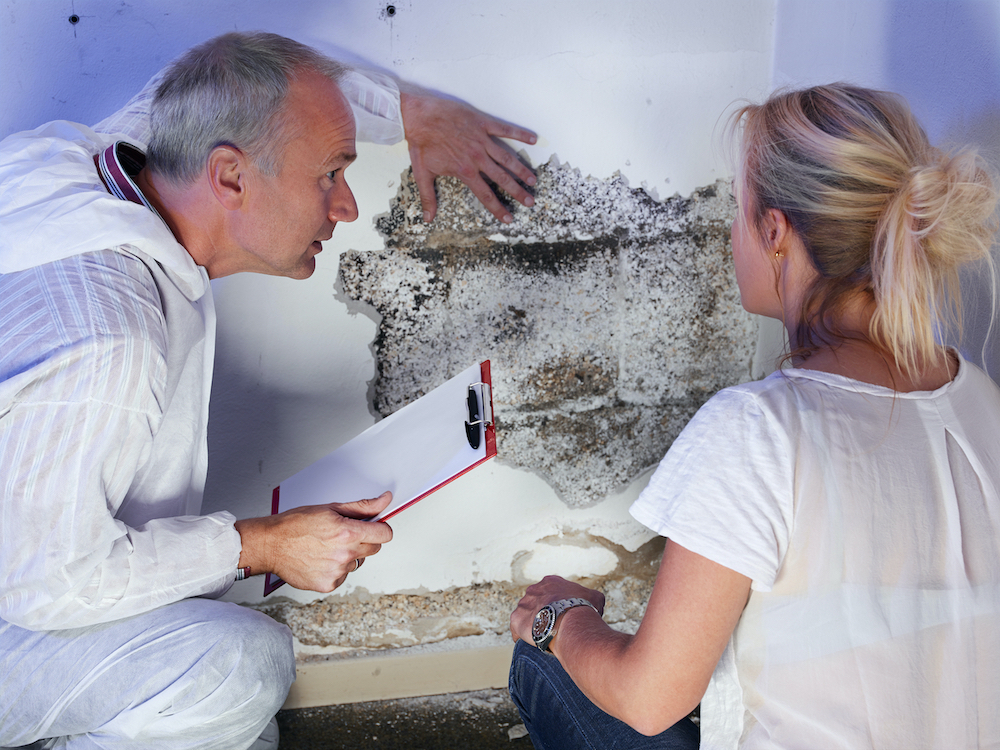
The Threat of Moisture in Your Garage

Most Common Effects of High Humidity and Condensation In a Garage
High humidity in garages can have several detrimental effects:
-
Mold and Mildew Growth
Humid environments are ideal for mold and mildew, which can thrive on surfaces like furniture, cardboard boxes, and clothing. Mold growth damages your belongings and poses health risks, such as allergies and respiratory issues.
-
Rust and Corrosion
High humidity promotes rust and corrosion on metal items. Tools, bicycles, and automotive parts stored in humid garages are particularly vulnerable. Rust compromises the integrity and functionality of these items, reducing their lifespan.
-
Pest Infestations
Moisture attracts pests like termites, cockroaches, and rodents. These pests can cause significant damage to stored items by chewing through packaging, nesting inside boxes, and contaminating surfaces. Additionally, they may introduce bacteria and diseases to your garage environment.
Common Sources of Condensation
Garage condensation can occur in both hot and cold environments. Common sources include:
- Seasonal Temperature Changes: Low winter temperatures and rising humidity in spring and early summer can cause condensation.
- Rainwater and Melting Snow: Water brought in by parked cars can increase humidity levels in the garage.
- Running Appliances: Appliances like humidifiers, refrigerators, water heaters, washing machines, dryers, and freezers can increase condensation if not adequately ventilated.
- Improper Roof Drainage: Leaks from poor roof drainage can introduce moisture.
- Storing Firewood: Firewood retains moisture and can create humid conditions.
- Storage of Excess Liquids: Excess liquids can evaporate into the air, increasing the moisture level.
- Cardboard Boxes: Cardboard can retain moisture and contribute to higher humidity.
- Poor Weatherstripping: Improper weatherstripping around garage and man doors can allow moisture to enter.
Effective Ways to Reduce Garage Condensation
- Use Insulated Glass: Installing insulated glass in the glass section of your garage door can significantly reduce condensation by balancing humidity and temperature.
- Insulate Your Garage: Proper insulation, including the garage door, helps maintain temperature and prevent condensation. Insulating your garage door, often considered the “fourth wall,” can make a significant difference.
- Install Weather-Tight Seals: Ensure your garage door has quality weather-tight seals to prevent moisture from entering. Over time, weather stripping can wear out and contribute to moisture buildup.
- Manage Moisture Sources: Wipe snow and rain off your car before parking in the garage. Properly manage appliances and heating systems to minimize excess moisture.
- Ventilate the Garage: Open the garage doors periodically to balance out humidity and temperature levels. Proper ventilation helps prevent moisture accumulation.
- Check for Water Leaks: Regularly inspect plumbing for leaks and winterize unheated spigots to prevent freezing and cracking, which can lead to leaks.
- Improve Property Grading and Drainage: If your garage is at the bottom of a grade, add drainage features to divert water away from the building.
- Control Outdoor Humidity: High humidity levels in your area can affect your garage. Be aware of this inherent risk and take steps to mitigate its impact.
- Prepare for Spring Thaws: The worst time for moisture in a garage is when ice and snow melt rapidly during spring thaws. Manage runoff to prevent water from seeping into your garage or its foundation.
Important Information If You’re Considering Adding Insulation to Your Existing Garage Door
Adding insulation to your garage door can change its weight, potentially making it unbalanced. Your garage door has springs calibrated to the door’s original weight, ensuring it opens and closes easily. When properly balanced, the door should stay in place when half open and not shoot up or fall down. Even a small change in weight, such as from adding insulation, can upset this balance.
Garage door springs are under heavy tension. If you’re not experienced with balancing garage doors, it’s crucial to hire a professional. This is especially important if you have a motorized garage door opener, as the motors are designed for balanced doors. An unbalanced door can add extra weight, causing premature wear on the motor and affecting the overall operation of the door.
After insulating the door, always ensure your garage door is properly balanced to avoid these issues.
To View More on How To Perform a Garage Door Balance Test
Additional Tips and Professional Help
- Temperature Control: Installing a ventilation fan, ductwork, or a garage heater can help manage moisture. Avoid propane heaters as they emit high levels of water vapor.
- Use a Vapor Barrier: Install wall vapor barriers to prevent moisture buildup. Avoid using vapor barriers on garage ceilings to prevent water vapor from being trapped inside.
- Check Ventilation and Drainage: Ensure proper ventilation and unobstructed drainage to keep condensation at bay. Clean ventilation systems like turbine roof vents regularly.
- Apply Floor Coating: Use polyaspartic or epoxy coatings to seal concrete and reduce condensation. These coatings can also protect against damage and prevent moisture from seeping into the concrete slab.
- Install a Dehumidifier: A dehumidifier can effectively minimize condensation issues. Maintain humidity levels between 30-40% to prevent condensation.
- Use Garage-Friendly Appliances: Choose appliances designed for garage environments to limit moisture issues. Avoid using standard models that may not perform well in garages.
- Professional Help: Contact HVAC professionals if condensation persists. They can provide tailored solutions to maintain a dry and safe garage environment.

Conclusion
Understanding the causes of garage condensation and implementing preventive measures can protect your garage and belongings from moisture-related damage. You can ensure a dry and safe environment for your stored items by managing humidity and moisture levels.
If you’re experiencing garage condensation issues or looking to improve your garage’s insulation, Overhead Door Company of Huntsville/North Alabama™ is here to help. We offer a range of services, including the installation of insulated garage doors, to keep your garage dry and safe. Contact us today to discuss your needs and get a free estimate.
Service Areas: Huntsville, Athens, Madison, Decatur, Harvest, Hazel Green, Meridianville, Brownsboro, Hampton Cove, Tanner, Priceville, Gurley, and surrounding metro areas.
Visit our Troubleshooting Guide
To View Our Residential Garage Door Collections
Disclaimer: The information contained herein is not meant to be comprehensive and is for informational purposes only. You should not undertake to perform anything described herein without adequate training and/or supervision. Overhead Door Company of Huntsville/North Alabama™ disclaims any responsibility for any injury, damage, or loss as a result of reliance upon the information found on this site/blog.





